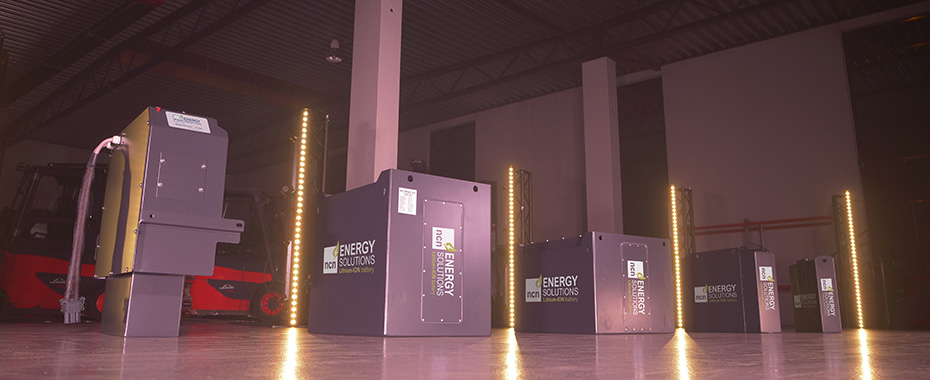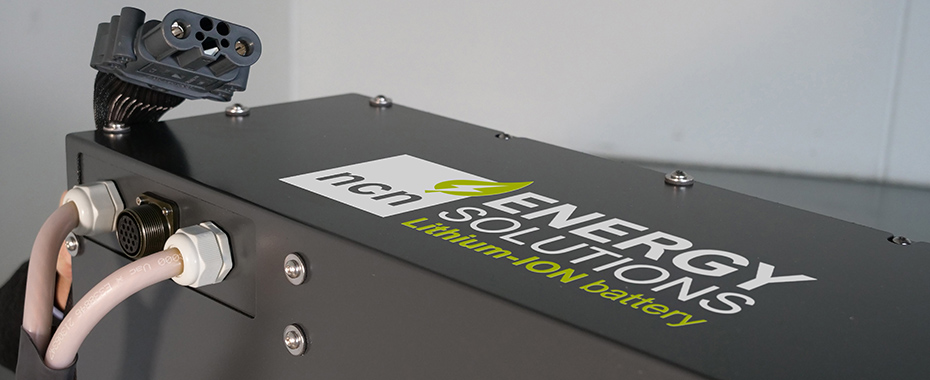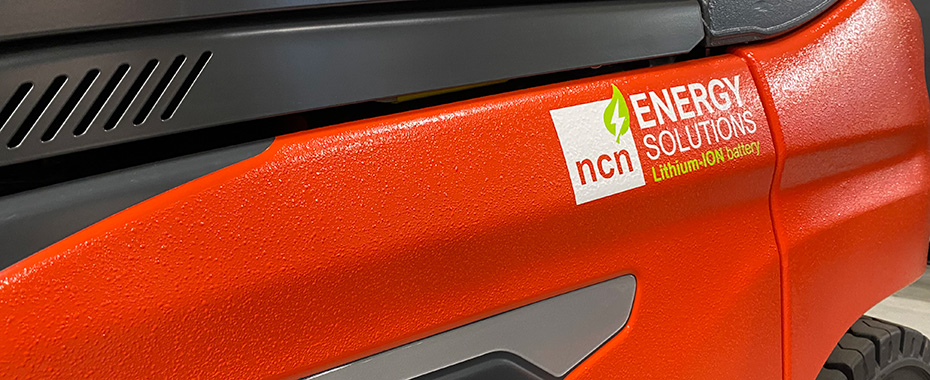
LIFEPO4 LITHIUM-ION BATTERIES ARE THE SAFE CHOICE
At NCN Energy Solutions, our primary goal is to provide safe and reliable battery solutions to our customers, and our technical energy-specialists are happy to consult on all types of industrial batteries. They are often faced with questions about Lithium-ION batteries and the safety surrounding this type of battery.
- We find that many are hesitant to adopt Lithium-ION batteries because they are afraid of battery fires. Right now, we are also seeing some insurance companies being skeptical about Lithium-ION batteries. But it is entirely wrong to paint all types of Lithium batteries with the same brush, says Kasper H. Nielsen, head of NCN Energy Solutions.
There is indeed a difference between the various types of Lithium-ION industrial batteries found on the market. In fact, there are no less than 6 different variants available worldwide today, and NCN Energy Solutions has prioritized safety and chosen a type of battery that does not contain cobalt, namely a type called LiFePO4. Therefore, there is virtually no fire hazard.
Below, you will find answers to some of the questions that our energy technical experts are most frequently asked in connection with Lithium-ION industrial batteries.

ARE LIFEPO4 BATTERIES REALLY SAFER THAN OTHER LITHIUM-ION BATTERIES?
Yes, LiFePO4 batteries are known for their extraordinary safety properties. They offer significantly lower fire risk compared to other types of lithium-ion batteries. This is due to their thermal stability, high thermal breakdown threshold, and natural resistance to thermal runaway.
WHAT IS THERMAL STABILITY, AND WHY IS IT IMPORTANT?
Thermal stability refers to the battery's ability to withstand overheating without triggering dangerous reactions. LiFePO4 batteries have excellent thermal stability, which means they remain cool and resistant to overcharging or short-circuiting, reducing the risk of fire.
- Even if the battery is in an area where there is a fire, there is very little risk of the fire spreading to the battery, and the fire cannot spread between the cells as it does with other types of lithium batteries, Kasper H. Nielsen explains.
He points out that all Lithium-ION batteries from NCN Energy Solutions are also equipped with temperature monitoring, energy flow monitoring, and any imbalances between cells. This means that the battery will simply shut off automatically if any of these parameters exceed the allowable limits.
CAN LIFEPO4 BATTERIES WITHSTAND MECHANICAL STRESS?
Yes, LiFePO4 batteries are more robust and resistant to mechanical stress and shocks compared to other battery types. This reduces the risk of internal short circuits and mechanical failures that could potentially trigger a fire.
WHAT HAPPENS IF A LIFEPO4 BATTERY IS EXPOSED TO EXTREME TEMPERATURES?
Even under extreme temperature conditions, LiFePO4 batteries have a high thermal breakdown threshold. This means that the risk of critical thermal reaction or fire is minimal, making them suitable for use in environments with fluctuating temperatures.
- Even if the battery is in an area where there is a fire, there is very little risk of the fire spreading to the battery, and the fire cannot spread between the cells as it does with other types of Lithium batteries, Kasper H. Nielsen explains.

IS ELECTROLYTE LEAKAGE A PROBLEM WITH LIFEPO4 BATTERIES?
No, the electrolyte used in LiFePO4 batteries is not flammable and does not pose a threat to the environment. Therefore, the risk of electrolyte leakage and the potential fire hazard associated with it are drastically reduced.
HOW ARE LIFEPO4 INDUSTRIAL BATTERIES MONITORED AND PROTECTED?
Our Lithium-ION industrial batteries are equipped with advanced monitoring and protection systems, including thermal sensors, power circuits, and short-circuit protection. These systems work together to constantly monitor the battery's condition and performance and intervene
This means that the battery will simply shut off automatically if any of these parameters exceed the allowed limits.
WHY SHOULD I CHOOSE LIFEPO4 BATTERIES FOR MY INDUSTRIAL NEEDS?
In addition to their exceptional safety advantages, LiFePO4 Lithium-ION batteries have impressive durability and a long lifespan. Although they may have a higher price than other battery types, the investment quickly pays off due to their long lifespan and minimal risk of accidents and fires in the industry.
- Over the past 8 years, we have delivered approximately 5,000 battery systems, and so far, it has not been necessary to replace a single battery. We expect them to have a lifespan of 12-15 years, but during that period, you may also have worn out more than one truck along the way," says Kasper H. Nielsen.

WOULD YOU LIKE US TO HELP YOU FIND THE RIGHT ENERGY SOLUTION FOR YOUR TASKS?
Fill out the form with your information, and we will make sure to call you as soon as possible. You can also call our expert at the phone number below.





































